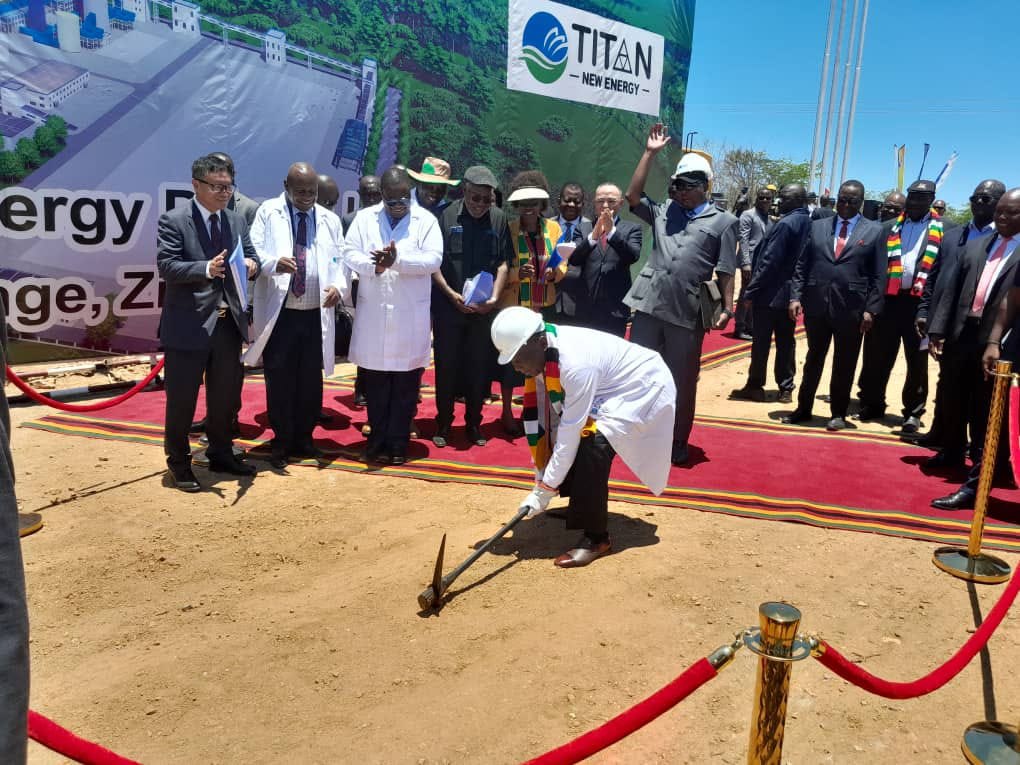President Emmerson Mnangagwa has inaugurated the construction of a 720 MW thermal power plant in Hwange, marking a significant milestone in Zimbabwe’s efforts to strengthen its energy infrastructure and advance economic development. The project, spearheaded by Titan Energy (Private) Limited in partnership with state-owned ZESA Holdings, underscores the government’s dedication to achieving the targets outlined in Vision 2030, which seeks to transform Zimbabwe into an upper-middle-income economy.
The thermal power plant is a direct response to Zimbabwe’s persistent energy supply challenges, exacerbated by reduced output from facilities like the Kariba Hydro-Power Station. Leveraging the country’s abundant coal reserves, the Hwange plant is expected to play a pivotal role in addressing growing energy demands from both the industrial and domestic sectors.
The project will use waste coal from local mining operations to generate electricity, ensuring resource optimization while reducing environmental waste. This innovative approach aligns with the government’s broader strategy of maximizing value from Zimbabwe’s natural resources to foster sustainable growth.
The development of the Hwange plant will be carried out in phases, beginning with the generation of 160 MW in its initial stage. Once fully operational, the facility will deliver 720 MW to the national grid, significantly enhancing the country’s energy supply capacity. Additionally, the project includes plans for a 200 MW solar power plant in its second phase, reflecting a forward-looking commitment to diversify Zimbabwe’s energy portfolio and integrate renewable energy sources.
This phased strategy mirrors global energy trends, where a combination of traditional and renewable energy solutions is increasingly being adopted to ensure both reliability and sustainability.
Matabeleland North Province, home to vast coal reserves, continues to attract substantial investments in the energy sector. The region’s strategic importance as a national energy hub is being reinforced by projects like the Hwange thermal power plant. By capitalizing on its natural endowments, the province is not only contributing to Zimbabwe’s energy security but also driving local economic development through job creation and infrastructure upgrades.
President Mnangagwa emphasized the importance of the project for national development, stating that it reflects the government’s unwavering commitment to infrastructure development as a cornerstone of economic progress. “This project is a testament to our vision for a self-sufficient Zimbabwe, where energy powers industrial growth and supports the livelihoods of our people,” he noted during the launch.
The partnership between Titan Energy and ZESA Holdings is one of the outcomes of the mega-deals secured during President Mnangagwa’s recent visit to China. These collaborations highlight Zimbabwe’s efforts to attract foreign investment and build strategic alliances that support its developmental goals.
The involvement of Chinese technology and expertise in the Hwange project is expected to ensure its successful execution. This cooperation also signals Zimbabwe’s intent to strengthen ties with global partners as it works toward achieving energy independence.
The Hwange thermal power plant is more than an infrastructure project—it is a cornerstone of Zimbabwe’s broader ambitions under Vision 2030. By addressing the critical issue of energy supply, the government aims to create an enabling environment for industrialization, attract further investment, and improve the quality of life for its citizens.
As Zimbabwe continues to embrace a blend of traditional and renewable energy sources, projects like the Hwange plant illustrate a strategic commitment to sustainable growth. With Matabeleland North emerging as a key driver of national energy development, the region is poised to play a central role in powering Zimbabwe’s transformation into a more prosperous and resilient nation.













Leave a comment